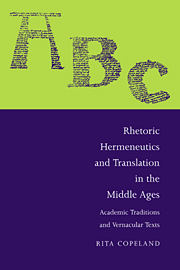Book contents
- Frontmatter
- Contents
- Acknowledgments
- List of abbreviations
- Introduction
- 1 Roman theories of translation: the fusion of grammar and rhetoric
- 2 From antiquity to the Middle Ages I: the place of translation and the value of hermeneutics
- 3 The rhetorical character of academic commentary
- 4 Translation and interlingual commentary: Notker of St. Gall and the Ovide moralisé
- 5 Translation and intralingual reception: French and English traditions of Boethius' Consolatio
- 6 From antiquity to the Middle Ages II: rhetorical invention as hermeneutical performance
- 7 Translation as rhetorical invention: Chaucer and Gower
- Afterword
- Notes
- Bibliography
- 1 Index of names and titles
- 2 General index
Afterword
Published online by Cambridge University Press: 03 December 2009
- Frontmatter
- Contents
- Acknowledgments
- List of abbreviations
- Introduction
- 1 Roman theories of translation: the fusion of grammar and rhetoric
- 2 From antiquity to the Middle Ages I: the place of translation and the value of hermeneutics
- 3 The rhetorical character of academic commentary
- 4 Translation and interlingual commentary: Notker of St. Gall and the Ovide moralisé
- 5 Translation and intralingual reception: French and English traditions of Boethius' Consolatio
- 6 From antiquity to the Middle Ages II: rhetorical invention as hermeneutical performance
- 7 Translation as rhetorical invention: Chaucer and Gower
- Afterword
- Notes
- Bibliography
- 1 Index of names and titles
- 2 General index
Summary
Gower's critique of academic discourse would not be possible without the tradition of vernacular translation which emerges from the interpretive practice of the medieval schools. We have seen how translation redirects and assimilates those practices into a vernacular hermeneutics. The tradition that I have examined here, translation of auctores from the arts curriculum, articulates some of the most important critical structures that govern the relationship between Latin and vernacular in the Middle Ages. Constructing such a history of translation invites us to study medieval critical practices themselves more critically, to analyze criticism the way we have come to interrogate literary texts, making visible the competing forces of signification within seemingly unified theoretical systems. Thus we see that when rhetoric in antiquity most boldly proclaims its difference from grammar is when it is most grammatical in its orientation; and when medieval exegesis professes its subservient and supplementary relation to master texts is when it most threatens to overtake and displace those texts.
A critical reading of the history of criticism yields more, however, than the intellectual satisfaction of showing how theoretical systems subverted their own claims to coherence. It also helps us to discern what was ideologically at stake in academic representations of textual culture. Latin exegesis of the auctores must profess its own supplementarity (and the exegetes must believe this) because the raison d'être of Latin clerical culture is to function as a sign of continuity between the pagan and the Christian intellectual imperia: in the interests of such continuity, medieval criticism cannot propose to outdo and supplant the revered auctores.
- Type
- Chapter
- Information
- Rhetoric, Hermeneutics, and Translation in the Middle AgesAcademic Traditions and Vernacular Texts, pp. 221 - 229Publisher: Cambridge University PressPrint publication year: 1991



